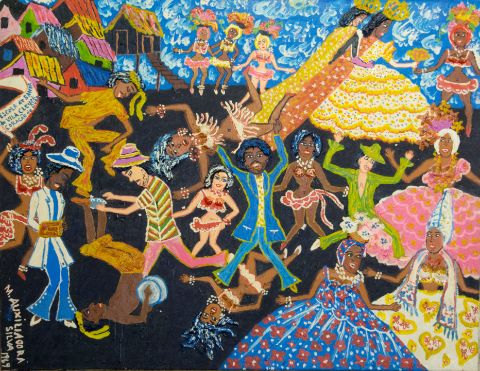Maria Auxiliadora

Samba. Photo: Courtesy of Musée d’Art Naïf et des Arts Singuliers, Laval
In the works Samba and the untitled agricultural scenes, the self-taught artist Maria Auxiliadora reminds us of the feminist call that the personal is political. Her art depicts scenes of domestic and rural life, of Afro-Brazilian religions, dance, carnivals, and quotidian scenes of festivities and popular culture. Born into a poor, working class home with a strong Afro-Brazilian tradition and artistic tendencies amongst many family members, Auxiliadora began experimenting with different practices early on and continued producing art in parallel to being a domestic worker—work she took on to help sustain her family at the age of twelve. Her later work as an embroiderer in a factory in the Brás neighbourhood of São Paulo found echoes in her practice as she settled on painting, but also continuously added texture and dimension to the pieces, often including her own hair. Auxiliadora’s international recognition has come only post-mortem, but her work is now considered a political intervention that reformulates the representation of non-hegemonic cultures and the everyday life and bodies that inhabit them.
Works in the exhibition: Samba (1969), painting, mixed media on canvas, 49.7 × 64.6 cm. Courtesy of Musée d’Art Naïf et des Arts Singuliers, Laval; Untitled (1972), painting, mixed media on canvas, 19 × 26 cm; Untitled (1974), painting, gouache on cardboard glued to eucatex, 50.5 × 67 cm. Courtesy of Estate Maria Auxiliadora and Mendes Wood DM, São Paulo, Brussels, and New York